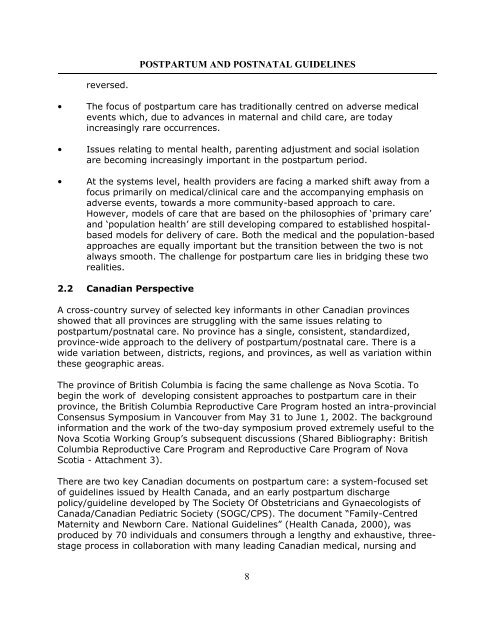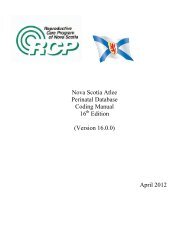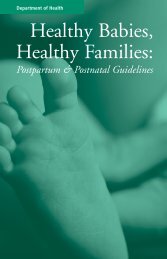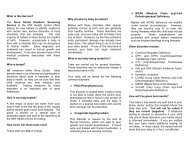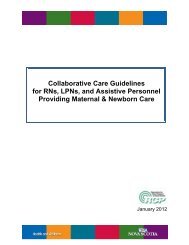Postpartum & Postnatal Guidelines - Reproductive Care Program of ...
Postpartum & Postnatal Guidelines - Reproductive Care Program of ...
Postpartum & Postnatal Guidelines - Reproductive Care Program of ...
You also want an ePaper? Increase the reach of your titles
YUMPU automatically turns print PDFs into web optimized ePapers that Google loves.
POSTPARTUM AND POSTNATAL GUIDELINES<br />
reversed.<br />
• The focus <strong>of</strong> postpartum care has traditionally centred on adverse medical<br />
events which, due to advances in maternal and child care, are today<br />
increasingly rare occurrences.<br />
• Issues relating to mental health, parenting adjustment and social isolation<br />
are becoming increasingly important in the postpartum period.<br />
• At the systems level, health providers are facing a marked shift away from a<br />
focus primarily on medical/clinical care and the accompanying emphasis on<br />
adverse events, towards a more community-based approach to care.<br />
However, models <strong>of</strong> care that are based on the philosophies <strong>of</strong> ‘primary care’<br />
and ‘population health’ are still developing compared to established hospitalbased<br />
models for delivery <strong>of</strong> care. Both the medical and the population-based<br />
approaches are equally important but the transition between the two is not<br />
always smooth. The challenge for postpartum care lies in bridging these two<br />
realities.<br />
2.2 Canadian Perspective<br />
A cross-country survey <strong>of</strong> selected key informants in other Canadian provinces<br />
showed that all provinces are struggling with the same issues relating to<br />
postpartum/postnatal care. No province has a single, consistent, standardized,<br />
province-wide approach to the delivery <strong>of</strong> postpartum/postnatal care. There is a<br />
wide variation between, districts, regions, and provinces, as well as variation within<br />
these geographic areas.<br />
The province <strong>of</strong> British Columbia is facing the same challenge as Nova Scotia. To<br />
begin the work <strong>of</strong> developing consistent approaches to postpartum care in their<br />
province, the British Columbia <strong>Reproductive</strong> <strong>Care</strong> <strong>Program</strong> hosted an intra-provincial<br />
Consensus Symposium in Vancouver from May 31 to June 1, 2002. The background<br />
information and the work <strong>of</strong> the two-day symposium proved extremely useful to the<br />
Nova Scotia Working Group’s subsequent discussions (Shared Bibliography: British<br />
Columbia <strong>Reproductive</strong> <strong>Care</strong> <strong>Program</strong> and <strong>Reproductive</strong> <strong>Care</strong> <strong>Program</strong> <strong>of</strong> Nova<br />
Scotia - Attachment 3).<br />
There are two key Canadian documents on postpartum care: a system-focused set<br />
<strong>of</strong> guidelines issued by Health Canada, and an early postpartum discharge<br />
policy/guideline developed by The Society Of Obstetricians and Gynaecologists <strong>of</strong><br />
Canada/Canadian Pediatric Society (SOGC/CPS). The document “Family-Centred<br />
Maternity and Newborn <strong>Care</strong>. National <strong>Guidelines</strong>” (Health Canada, 2000), was<br />
produced by 70 individuals and consumers through a lengthy and exhaustive, threestage<br />
process in collaboration with many leading Canadian medical, nursing and<br />
8


